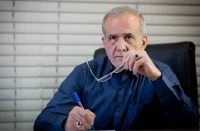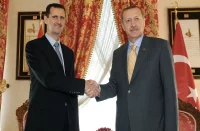Eldar KASAYEV (Russia)
The Bushehr nuclear power plant—the first one in Iran and the entire Middle East—achieved criticality on August 21. A ceremony celebrating the event was attended by major Russian and Iranian officials, including Rosatom chief Sergei Kiriyenko and Iranian Atomic Energy Organization head Ali Akbar Salehi.
In fairness we should note that it will be several months before the controversial power plant will start to produce electricity; the precise date will depend largely on Iran’s government. Next Saturday, however, Russia will deliver fresh nuclear fuel from its stockpile to the reactor at Bushehr, and that will fully justify calling it a nuclear power plant.
Peaceful purposes?
This event would seem to leave no doubt about the highly successful and strong partnership between the two countries; however, rapid globalization, the confrontation with the United States and the implementation of the nuclear program have significantly complicated Russian-Iranian relations at the present stage.
The start-up has only exacerbated the already acute conflict over Iran’s nuclear program. Despite Moscow’s willingness to supply nuclear fuel to Tehran, the latter is unwilling to give up its own uranium enrichment program.
That has produced two different reactions among the international and regional “players,” one of them being a chain reaction. First, the West will suspect Iran even more of seeking to develop nuclear weapons under cover of a civilian nuclear program. Second, the Persian Gulf states will begin actively lobbying for the rapid development of their own nuclear technologies. There are very strong signs that that will happen.
For example, Kuwait concluded an agreement with France this spring to acquire nuclear technologies and equipment. The UAE announced that it was starting a seven-year project to build a nuclear facility. Nor are Qatar, Egypt and Syria averse to developing nuclear technologies and related infrastructure, as officially announced by authorized persons.
It is noteworthy that Iran’s partner in Bushehr has recently hardened its tone towards its “recalcitrant neighbor.”
Our country’s position on the Iranian “nuclear file” is ambiguous. On the one hand, Moscow supports Tehran (as the startup of the nuclear power plant clearly shows) and does not support the imposition of unilateral sanctions by the United States, the EU and Japan. On the other hand, Russia supported the June UN Security Council sanctions, thereby greatly antagonizing Iran’s political elite and the Iranian people.
“Gently in manner—strongly in deed”
On May 17, Iran concluded a contract with Turkey to exchange low-enriched for highly-enriched uranium. In reaction, the United States, Russia and China reached agreement on UN Resolution 1929, which would introduce new economic sanctions.
The UN Security Council approved the resolution on June 9. Under the sanctions, Iran is prohibited from investing in certain industries—uranium mines, for example. The sale of eight types of conventional arms to Iran is also prohibited. In addition, the sanctions package contains three supplements listing companies, private individuals and Iranian banks whose foreign assets will be frozen. Paragraphs allowing the inspection of Iranian ships in neutral waters were added.
In fairness, it is worth noting that Washington “assisted” the UN Security Council in getting 12 votes in favor of the resolution. Recently, the United States repeatedly has officially announced that it is tightening the sanctions regime against Iran to include, among other things, a boycott on some Iranian financial and governmental institutions and sanctions against foreign (including Russian) business organizations operating in Iran. The White House believes that sanctions should also be imposed on some large construction, transportation and oil and gas companies that the Obama administration has linked to funding of operations in support of various types of extremist terrorist organizations.
While in Moscow on an official visit this spring, US Secretary of State Hillary Clinton said that Iran has the right to civilian nuclear power but not nuclear weapons. If Iran succeeds in convincing the international community that it is not seeking to acquire nuclear weapons, it will be fully entitled to the civilian use of the atom. However, it is too early to talk about new sanctions against Iran.
As it turned out, this strong statement by a major American official could not be trusted because US policy towards Iran is in fact quite different.
In addition to the new sanctions, Iran’s economy has also been wrecked by the initial “soft sanctions” introduced by the UN and the United States. However, the current tightening of the sanctions could paralyze many sectors of the national economy and significantly reduce the standard of living of a majority of the population, which already is not one of the highest. The Majlis (Iran’s parliament) had good reason for blaming Iran’s president for the fact that, despite $120 billion from oil exports going into the state treasury, not one of the promised socio-economic programs for improving the economy has been implemented.
Tit for tat
It is quite natural that under the circumstances Russia and Iran cannot have the stable and balanced relations of true partners based on intertwined overlapping positions, divergent interests and, in many cases, a focus on finding acceptable solutions through compromise. In analyzing the foreign policy actions and “concessions” by the major players on the Iranian vector, it becomes obvious that all is not as simple as might appear at first glance and, as the saying has it, every cloud has a silver lining.
It is noteworthy that prior to Russia’s approval of the sanctions against Iran, Washington promised to stop resisting the export of the Russian S-300 air defense missile system to Iran. The White House was going to repay the Kremlin by agreeing to the foreign sale of the latest high-cost air defense technologies.
Once again, however, the US statements turned out to be a fairy tale, because the sanctions package adopted by the UN Security Council in June actually instituted a complete ban on the sale of the S-300 to Iran. The embargo included battle tanks, armored combat vehicles, large-caliber artillery systems, combat aircraft, attack helicopters, warships, and missiles and missile launchers covered by the UN Register of Conventional Arms.
President Dmitry Medvedev announced that Moscow would not sell combat systems to Iran.
Let’s see. For quite a long time now the United States at every step has been trumpeting the urgent need to “choke” Iran with tough economic sanctions, and it must be admitted, their efforts have paid off. Many highly influential international entities recently responded to Washington’s eloquent appeals with alacrity, among them the UN (including Russia), the EU and Japan.
The Americans celebrate in this “triumph” at least as much as they did on July 22 when the UN International Court recognized the legitimacy of the Kosovo government’s decision to declare its independence from Serbia.
So what kind of Russian antiaircraft system sales can we talk about when the United States succeeds in systematically putting its Persian counterparts in a difficult position? Even under the pressure of sanctions, with those weapons Tehran would be able to close its airspace to potential attacks by Israel or the United States itself.
In fairness, we note that Russia’s agreement to impose sanctions was still rewarded from across the sea. It appears that in exchange Washington allowed Moscow to finish building the nuclear power plant near the Iranian city, which had been under construction off and on for more than 35 years. It is unclear how long the start-up of the controversial plant would have been delayed if Russia had not voted this summer like Washington wanted.
“Que sera, sera”
Nevertheless, despite the launch of this major joint energy project, relations between Russia and Tehran are noticeably cooling. That is clear from the barrage of sharp and provocative accusations that the Iranian authorities are leveling at Russian officials with increasing frequency. For example, Iranian president Mahmoud Ahmadinejad actually called his Russian counterpart the “mouthpiece” of Iran’s enemies, motivated by the idea that some of Dmitry Medvedev’s actions and statements benefit American propaganda and harm Russian and Iranian national interests.
It is noteworthy that the current Russian-Iranian relations are intensely scrutinized by third nations and influenced by them. Cooperation between Moscow and Tehran may be viewed in political and expert circles in Russia, the domestic media or scholarly publications as the way ambitious neighbors interact in a friendly fashion. In the West, however, they are seen as an example of the short-sighted policies of the two countries.
We can find arguments in favor of both of those views today. In reality, however, events may line up more with one of those perceptions than the other, with the key question of late being what the likelihood is that Iran will go nuclear.
Will the policies of the two countries toward each other change after the Iran’s nuclear power plant goes into operation? If so, what direction will they take? Time will tell, and the countdown has already started.
Eldar Kasayev is a specialist on energy investments in the Middle East and Africa and a doctoral candidate at Moscow State Institute of International Relations (University) under Russia’s Ministry of Foreign Affairs.
Source: New Eastern Outlook














It should have been clear to everyone a long time ago that the United States is not interested in anything Iran has to say – they’re building a nuclear weapon, and that’s that. It doesn’t matter that Israel has a couple hundred of them, or that Israel repeatedly refused to sign the Non-Proliferation Treaty, refused to open its Dimona facility to UN inspectors….none of that matters, because Israel is a friend. Israel is the only nuclear power the U.S. will permit in the Middle East.
I’m not saying that to be anti-Israel, but to point out how some nations are given a free pass while others can’t do anything right. Iran is a signatory to the NPT, and voluntarily permitted an even more invasive inspection protocol than was required. Enriched uranium does not necessarily mean a nuclear weapon – only very highly enriched uranium (above 85%) is suitable for weaponizing purposes, and none enriched to such a degree has been found in Iran.
None of that matters to America. The dirty Arabs (never mind that Iranians are not Arabs) are up to their dirty tricks again, and they must be stopped.